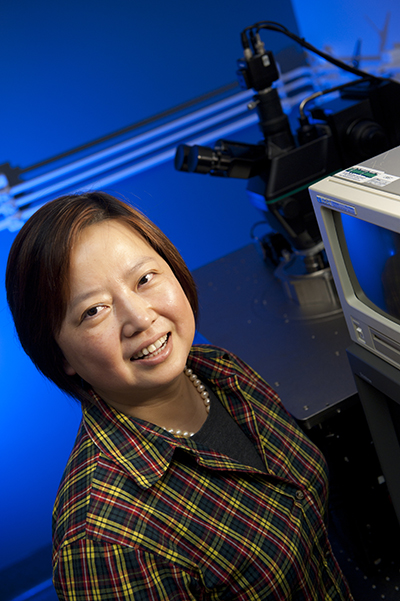Engineering Professor Selected as ASME Fellow
Zhang recognized for interdisciplinary MEMS research

Xin Zhang, a Boston University College of Engineering (ENG) professor of mechanical engineering and materials science and engineering, has been named an American Society of Mechanical Engineers (ASME) fellow. The honor, bestowed on longtime members who have demonstrated significant engineering achievements, recognizes Zhang’s internationally renowned research using microelectromechanical systems (MEMS) to address a wide range of important problems in advanced materials, biomedicine, and energy.
In the area of advanced materials, she has applied MEMS techniques to develop metamaterials, arrays of engineered structures that act like artificial atoms and exhibit unusual properties such as negative refractive indices and cloaking. She has focused on creating metamaterials in the terahertz range (wavelengths between optical and microwave frequencies) that may ultimately be used for imaging, chemical detection, surveillance, and high-speed electronic circuits.
In biomedicine, she has developed a MEMS-based toolset to analyze cellular behavior, yielding knowledge that could improve our understanding of cardiovascular, liver, and other diseases, and lead to novel therapies. And in the energy domain, she has developed micro-gas chromatography and microfluidic communication systems designed to improve the efficiency and safety of oil and gas extraction.
Zhang is one of only 3,347 fellows out of 110,835 ASME members.
“I am thrilled to see this formal recognition from ASME,” says Zhang, who joins Allan Pierce, an ENG professor emeritus, as the College of Engineering’s second ASME fellow. “Working in the application of miniaturization technologies to broad, societally relevant problems, I am continuously pursuing new ‘tools’ with which to develop solutions. Mechanical engineering is a terrific profession.”
A BU faculty member since 2002, Zhang leads an interdisciplinary team of researchers focused on fundamental and applied aspects of MEMS and nanotechnology. Her research group—the Laboratory for Microsystems Technology—seeks to understand and exploit interesting characteristics of micro/nanomaterials, micro/nanomechanics, and micro/nanomanufacturing technologies with forward-looking engineering efforts and practical applications ranging from energy to health care to homeland security.
In 2009, Zhang was named ENG’s inaugural Distinguished Faculty Fellow, a five-year appointment given to tenured ENG faculty on a clear trajectory toward an exemplary career in all dimensions of science and engineering. She has received numerous awards for research excellence, including the National Science Foundation Faculty CAREER Award, and has participated in US and international National Academy of Engineering symposia. She has published 124 papers in interdisciplinary journals.
Founded in 1880 by a small group of industrialists and comprising more than 140,000 members in 151 countries, ASME is a nonprofit membership organization that enables collaboration, knowledge sharing, career enrichment, and skills development across all engineering disciplines for the purpose of helping the global engineering community to advance solutions that improve the quality of life.